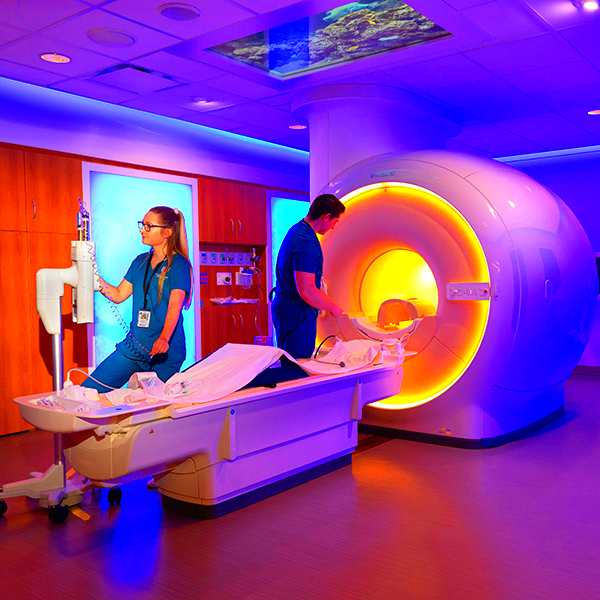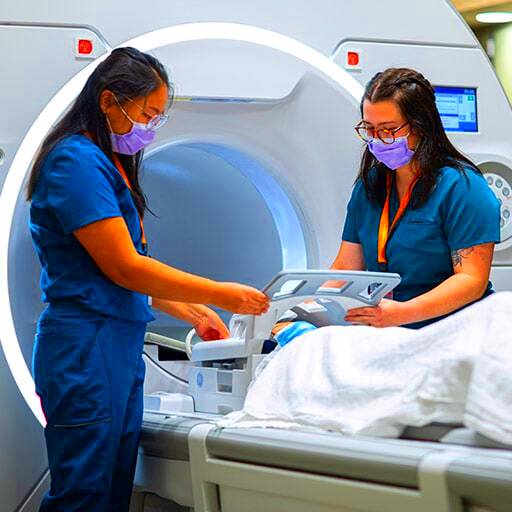Becoming an MRI technologist is an exciting and rewarding career for those interested in healthcare and technology. MRI technologists play a vital role in helping doctors diagnose and treat patients by using advanced imaging technology. These professionals operate MRI machines to capture high-quality images of the inside of the human body. Whether it's detecting tumors, spinal injuries, or neurological disorders, MRI technologists provide essential insights that guide medical treatments. This job offers a perfect balance between patient care and technology, making it a fulfilling path for many healthcare enthusiasts.
Required Educational Qualifications for MRI Technologists

To become an MRI technologist, you need a strong foundation in both science and healthcare. The educational journey typically includes completing a formal training program, either through a degree or certificate. Here’s a breakdown of the necessary qualifications:
- High School Diploma or GED: Start with a basic high school education. Courses in biology, physics, and mathematics will give you a head start.
- Associate’s Degree in Radiologic Technology: Most MRI technologists pursue a two-year associate’s degree in radiologic technology. This program covers the basics of medical imaging, patient care, and anatomy.
- Certification in MRI Technology: After completing your degree, you'll need to get certified. The American Registry of Radiologic Technologists (ARRT) offers certification exams that test your knowledge and skills in MRI technology.
- Continuing Education: To maintain certification, MRI technologists must complete continuing education courses to stay up-to-date with advancements in MRI technology.
While some technologists start with a general radiologic technology degree, many choose to specialize in MRI to enhance their career prospects. Getting certified is crucial, as it demonstrates your proficiency and commitment to the field.
Key Skills Needed to Succeed as an MRI Technologist

Being an MRI technologist requires more than just technical knowledge. You’ll need a range of skills to ensure that patients are comfortable and that the imaging process runs smoothly. Here are some of the most important skills for success in this field:
- Technical Proficiency: You need to be comfortable with operating complex MRI machines and understanding their settings. This includes adjusting parameters to capture the best possible images.
- Attention to Detail: MRI scans must be clear and precise, so you need to pay close attention to every image you capture. Small errors in settings or positioning can lead to inaccurate results.
- Communication Skills: MRI technologists need to explain procedures to patients and make sure they’re comfortable throughout the process. Clear communication helps reduce patient anxiety and ensures they follow instructions correctly.
- Patient Care Skills: Working with patients is at the core of this job. MRI technologists should be compassionate, empathetic, and able to put patients at ease, especially since many people find the procedure intimidating.
- Problem-Solving: Occasionally, MRI machines may experience technical issues or patients may have unique medical needs. Being able to troubleshoot and adapt is crucial for smooth operations.
Having a combination of technical and interpersonal skills will make you stand out as an MRI technologist. It’s not just about knowing how to work the machine, but also ensuring that patients feel well-cared for during their scans.
Steps to Becoming a Certified MRI Technologist
Becoming a certified MRI technologist involves a few key steps. Each step builds your knowledge and expertise, ensuring that you are fully prepared to take on this important healthcare role. Here's a general outline of the process:
- Step 1: Obtain a High School Diploma or GED: The first step is completing your high school education. Focus on courses like biology, physics, and mathematics to lay a strong foundation for your future studies.
- Step 2: Enroll in an Accredited MRI Program: After high school, you’ll need to enroll in a radiologic technology program. Many community colleges and technical schools offer associate degrees in radiologic technology with a specialization in MRI. This typically takes two years to complete.
- Step 3: Gain Clinical Experience: Your MRI training program will include hands-on clinical experience. During this time, you’ll work with real patients and learn to operate MRI machines under the supervision of experienced technologists.
- Step 4: Obtain Certification: Once you’ve completed your education and clinical experience, you can take the certification exam. The American Registry of Radiologic Technologists (ARRT) offers certification for MRI technologists. Passing this exam proves your competence and qualifies you to work in the field.
- Step 5: Maintain Certification: After becoming certified, you must complete continuing education courses every few years to maintain your certification. This ensures you stay updated on the latest technologies and procedures.
Becoming a certified MRI technologist takes dedication and hard work, but the rewarding career opportunities make it worth the effort.
Important Tools and Technology for MRI Technologists
As an MRI technologist, you will work with specialized equipment and technology that is crucial for producing high-quality diagnostic images. Understanding these tools is essential for providing accurate results and ensuring patient safety. Here are some of the most important tools and technologies used by MRI technologists:
- Magnetic Resonance Imaging Machine: The MRI machine itself is the core tool of the profession. It uses powerful magnetic fields and radio waves to create detailed images of internal body structures.
- Patient Positioning Equipment: To capture clear and precise images, patients must be properly positioned. MRI technologists use various positioning devices such as cushions, supports, and straps to help position the patient comfortably and safely.
- Coils and Radiofrequency Equipment: MRI machines use specialized coils that send and receive radiofrequency signals. The right coil must be chosen depending on the area of the body being scanned.
- Computer Software: Advanced software programs are used to process and analyze MRI images. Technologists must be skilled in using these tools to adjust image quality and ensure that scans are clear and useful for diagnosis.
- Safety Equipment: Since MRIs use powerful magnets, safety is a top priority. MRI technologists use safety equipment such as magnetic field detectors, protective shields, and ear protection to ensure a safe environment for both patients and staff.
Familiarity with these tools and technologies is key to performing your job well and ensuring that patients receive the best care possible. Staying up-to-date with advancements in MRI technology is equally important in a field that’s constantly evolving.
Job Opportunities for MRI Technologists
Once you’ve completed your training and certification, you’ll find that there are plenty of job opportunities for MRI technologists. The healthcare field is always in demand for skilled professionals who can operate MRI machines and provide diagnostic images. Here are some of the common places where MRI technologists can work:
- Hospitals: Many MRI technologists work in hospital settings, where they conduct a wide range of scans on patients. Hospitals offer diverse work environments and opportunities for advancement.
- Outpatient Clinics: Some MRI technologists work in outpatient imaging centers or clinics. These clinics often focus solely on diagnostic imaging, providing a more specialized and predictable environment.
- Private Practices: MRI technologists may also find work in private medical practices, such as those run by orthopedic specialists, neurologists, or rheumatologists.
- Research Facilities: If you’re interested in the more scientific side of the profession, research institutions and universities may hire MRI technologists to assist with clinical studies and research projects.
- Mobile MRI Units: Some MRI technologists work for mobile imaging services, where they operate MRI machines in a variety of locations, bringing imaging technology directly to patients.
- Education and Training: Experienced MRI technologists may also choose to teach and train future MRI professionals, either in academic institutions or in specialized training programs.
The career outlook for MRI technologists is promising, with a growing demand for skilled professionals across various healthcare settings. Whether you choose to work in a hospital, clinic, or research facility, the opportunities for career growth are abundant.
Work Environment and Challenges in MRI Technology
The work environment for MRI technologists can vary depending on the setting, but it generally involves a combination of hands-on patient care and technical operation of MRI machines. MRI technologists work in hospitals, outpatient clinics, and specialized imaging centers. The job can be physically demanding and may involve long hours, especially in hospital settings where you may be required to work evenings, weekends, or on-call shifts.
In terms of challenges, MRI technologists often deal with the following:
- Patient Interaction: While many patients are calm and cooperative, others may feel anxious about undergoing an MRI scan. Some patients also have claustrophobia or difficulty staying still, which can make the job more challenging.
- Long Hours and Shifts: Depending on the facility, MRI technologists may need to work nights, weekends, or be on-call. Hospitals and emergency rooms can require a flexible schedule, which can sometimes lead to burnout.
- Physical Demands: The job can be physically taxing as MRI technologists often need to assist patients with mobility issues, adjust heavy equipment, and spend long periods standing or bending.
- Safety Concerns: MRI machines use strong magnetic fields, and while the risk of injury is low when safety protocols are followed, it is still crucial for technologists to be vigilant about patient and equipment safety.
Despite these challenges, many MRI technologists find the job rewarding due to the opportunity to make a direct impact on patient care and diagnostic procedures.
Salary and Career Growth for MRI Technologists
Salary and career growth for MRI technologists can vary based on factors such as location, experience, and the type of facility they work in. On average, MRI technologists enjoy competitive salaries with the potential for growth as they gain more experience and certifications.
Here’s a look at what you can expect in terms of salary and career progression:
| Experience Level | Average Annual Salary |
|---|---|
| Entry-level (0-2 years) | $55,000 - $65,000 |
| Mid-career (3-5 years) | $65,000 - $75,000 |
| Experienced (5+ years) | $75,000 - $85,000 |
In terms of career growth, MRI technologists can pursue various paths to enhance their career and salary potential. These include:
- Specialization: Technologists can choose to specialize in areas such as cardiovascular MRI, pediatric MRI, or musculoskeletal MRI, which can increase their value and salary.
- Advanced Certifications: Obtaining additional certifications in MRI-related technologies or other imaging modalities (like CT scans) can open up more job opportunities and increase salary prospects.
- Management Roles: Experienced MRI technologists may move into supervisory or management positions, overseeing imaging departments or teams.
- Education: Some MRI technologists transition into teaching roles, educating the next generation of MRI professionals, either in academic institutions or specialized training programs.
Overall, the salary outlook for MRI technologists is positive, and there are numerous opportunities for career advancement through experience, specialization, and further education.
FAQ: Common Questions About Becoming an MRI Technologist
Here are answers to some common questions people often ask when considering a career as an MRI technologist:
- What education do I need to become an MRI technologist?
You need to complete an accredited program in radiologic technology, followed by specialization in MRI. Most people pursue a two-year associate’s degree, which includes both classroom instruction and hands-on clinical training.
- How long does it take to become an MRI technologist?
It typically takes about two years to complete the required education and obtain certification. Some people may choose to pursue additional certifications or degrees, which can extend the time required.
- Is certification required to work as an MRI technologist?
Yes, certification is required to work as an MRI technologist in most states. The American Registry of Radiologic Technologists (ARRT) certification is the standard for this profession.
- What is the job outlook for MRI technologists?
The job outlook for MRI technologists is strong. As healthcare needs grow, particularly with an aging population, the demand for skilled imaging professionals is expected to rise. MRI technologists are also in high demand due to the increasing use of MRI technology in medical diagnoses.
- What is the work schedule like for MRI technologists?
MRI technologists may work full-time, part-time, or on-call. Hospitals often require round-the-clock imaging services, meaning you might work nights, weekends, or holiday shifts depending on where you are employed.
- Can I advance my career as an MRI technologist?
Yes, there are many opportunities for career advancement. You can specialize in different MRI techniques, take on leadership roles, or even transition into teaching or training future MRI technologists.
Conclusion
Becoming an MRI technologist is a rewarding career choice for individuals who are passionate about healthcare and technology. The role offers a blend of patient interaction and technical expertise, with plenty of opportunities for personal and professional growth. With the right education, skills, and certifications, you can build a successful career in MRI technology, contributing to patient care and playing a key role in medical diagnoses. Whether you're just starting out or seeking to specialize further, the field offers a stable career with strong salary potential and ample job opportunities. The demand for MRI technologists continues to grow, making this an excellent time to enter the profession and pursue a fulfilling career in medical imaging.











